|
|
|
Sort Order |
|
|
|
Items / Page
|
|
|
|
|
|
|
| Srl | Item |
| 1 |
ID:
174164
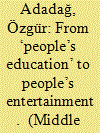

|
|
|
|
|
| Summary/Abstract |
This article analyzes the use of cinema by the People’s Republican Party in the early decades of republican Turkey. It focuses on cinema activities in the People’s Houses, which from 1932 onward opened in different regions of the country and operated as the party’s cultural organ. Relying on a range of archival materials, it shows that from the mid-1930s, cinema came increasingly to be used by the party as a propaganda device for promoting ‘people’s education’; from the mid-1940s, however, the party began to turn to cinema as a source of revenue to keep the People’s Houses financially afloat. While this change owed much to the political and economic conditions of the period following the Second World War, it was equally a product of the different expectations locals had of the cinema, as distinct from those of the People’s House administrators and the party leaders in Ankara. Where the latter group viewed cinema as a tool for ‘people’s education’, People’s House administrators saw it as a source of income, and the locals who visited the People’s Houses saw it as a means of entertainment.
|
|
|
|
|
|
|
|
|
|
|
|
|
|
|
|
| 2 |
ID:
174166
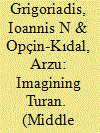

|
|
|
|
|
| Summary/Abstract |
While scholarly interest in the influence of Tatar intellectuals on Turkish nationalism has been strong, less attention has been paid to the interactions between Russian Azerbaijani and Ottoman Turkish intellectuals. This study applies theoretical tools developed by Benedict Anderson in the study of ethnic nationalism in the late Ottoman and Russian Empires. In doing so, this study focuses on the works of one leading intellectual from each side, Hüseyinzade Ali [Turan] and Mehmet Ziya [Gökalp]. Particular attention is paid to the concept of Turan, which they defined and elaborated as both a political ideal and a key element of the nationalist ideology they espoused through four poems they authored, two of which have homonymous titles. Their different views of the limits of the Turanian ‘imagined community’ and the political operationalization of the concept shed light on the development of ethnic nationalism in the declining Ottoman and Russian Empires. Ever since, Turan has become a significant symbolic conceptual tool that has fired the imaginations of Turkic nationalists (without, yet, having led to the establishment of a serious political movement).
|
|
|
|
|
|
|
|
|
|
|
|
|
|
|
|
| 3 |
ID:
174158
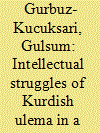

|
|
|
|
|
| Summary/Abstract |
Modern Kurdish thought encompasses many factions with diverse social, political, religious and ideological positions in and outside of Turkey.1 While our knowledge about the evolutions of the nationalist thought among Kurdish secular intellectuals has radically increased, the intellectual heritage of Kurdish religious intellectuals, the ulema, who have been searching for the best ways of delivering their societies from internal and external exploitations, have been mostly overlooked in Western academia. This article aims to bring to light the intellectual wrestling of a Kurdish mullah, Ali Zile of Diyarbakır, with the problems he believed Kurds faced from many angles: sheikhs, the passive madrasa tradition, the Kurdish secular/Marxist nationalism from the inside, and the Turkish nationalism and the Western imperialism from the outside.
|
|
|
|
|
|
|
|
|
|
|
|
|
|
|
|
| 4 |
ID:
174162


|
|
|
|
|
| Summary/Abstract |
This article analyses Turkey’s policy vis-à-vis the Palestinian Question from the end of the Second World War to the final months of 1948. During this interval, the main foreign policy issue on the agenda of the Turkish policy makers was the Soviet menace, against which the Turks sought the assistance of the British and the Americans. However, they did not align their Palestine policy with that of the Anglo-Americans, which supported the Zionist project. The Turks, who portrayed the Arabs in their school textbooks as traitors due to the revolt of Sharif Hussein during the First World War, endorsed the Arab cause in Palestine. The Kemalists were convinced that Palestine was historically Arab. Besides, they were co-religionists with the Arabs. Therefore, according to Ankara, the Arabs should have their own independent state in Palestine. In fact, far from following the Anglo-American policy in Palestine blindly, the Turkish government tried to persuade the Anglo-Americans to the Arab cause.
|
|
|
|
|
|
|
|
|
|
|
|
|
|
|
|
| 5 |
ID:
174161
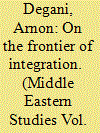

|
|
|
|
|
| Summary/Abstract |
This article analyzes the Histadrut, the quintessential Labor Zionist organization, and its policies regarding the Palestinian Arab citizens of Israel between the years 1948-1967. Using archival documents, published material, and oral history, the article reconstructs previously unexplored aspects of Palestinian membership in the Histadrut and reveals the spectrum of attitudes that it elicited. Whereas previous research has identified the Histadrut’s role in segregating the Jewish and Palestinian communities in Palestine, this article argues that after 1948, the Histadrut integrated the Palestinian Arabs into Israeli society in a way that complicates our understanding of Zionism.
|
|
|
|
|
|
|
|
|
|
|
|
|
|
|
|
| 6 |
ID:
174165
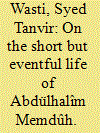

|
|
|
|
|
| Summary/Abstract |
Reforms introduced in 1839 (known as the Tanzimat) which were intended to modernize the Ottoman political and administrative structure, led inevitably to movements which introduced new literary ideas into the Ottoman cultural sphere. One of the first writers who wished to see Ottoman literature catch up with developments in Europe was Abdülhalîm Memdûh (1866 – 1905). His contributions covered the areas of poetry, prose, drama, journalism and political activism. Memdûh was not content with using classical chronicles; he published at the age of 22 the very first History of Ottoman Literature in Turkish, which served as the model for subsequent literary histories. Later, in his short life, he collaborated with Edmond Fazy, a Swiss writer, to publish a book in Paris titled Anthologie de l’amour turc, which contains Turkish love poems in French translation for the first time. This article evaluates the contributions of Abdülhalîm Memdûh in order to give him a place among the pioneers of 20th century Turkish literature.
|
|
|
|
|
|
|
|
|
|
|
|
|
|
|
|
| 7 |
ID:
174160
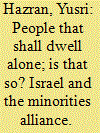

|
|
|
|
|
| Summary/Abstract |
The state of Israel, and the Zionist movement before it, has always considered itself to be facing an existential threat from hostile surroundings. Hence, seeking alliance with non-Arab nations and ethnic minority groups in the area was seen as a means of confronting this challenge. During the early decades of its existence, the Israeli establishment adopted the concept of the alliance of the periphery and the alliance of minorities developed by Israel’s first prime minister, David Ben-Gurion and his protégée, Reuven Shiloah, the founder of the Israeli intelligence service, the Mossad. This research project will demonstrate that, in opposition to apologetic and ideologically-motivated arguments that deny that alliance with minority communities has been a systematic policy, the minorities’ alliance has for decades been an important foundation of Israeli strategy vis-à-vis the Arab world. Furthermore, the article will argue and demonstrate that the ‘Minorities Alliance’ is derived from ideological, historical, and strategic considerations anchored in the very existence of Zionism and Israel. Furthermore, and on the same note, this conception and strategy cannot be disconnected from the self-perception of Zionism, its self-directed reading of Jewish history, and the Zionisation of the milieu.
|
|
|
|
|
|
|
|
|
|
|
|
|
|
|
|
| 8 |
ID:
174167
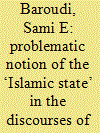

|
|
|
|
|
| Summary/Abstract |
This article examines the conceptualization of the 'Islamic state' by one reputable Arab Islamist scholar, Muhammad Abu Zahra. It contends that he fails to provide internally consistent answers to four key questions. First, does the Islamic state presently exist, or is it yet to be established; and if the latter is the case then by whom and how? Second, was the historic caliphate which allegedly extended from the death of the Prophet until the Ottoman caliphate’s dissolution an 'Islamic state'? Third, is the 'Islamic state' universal in scope, or can there be several Islamic states at the same time? Fourth, what is the relationship between the 'Islamic state' and Islamic unity; and can the latter be achieved outside the context of the 'Islamic state'? I argue that Abu Zahra’s conceptualization of the 'Islamic state' is heavily influenced by 'modern'/European ideas about the nation-state; as a sovereign entity with the authority to impose its writ over its citizens and territory. I conclude that the 'Islamic state' is a stillborn idea being a hybrid of two highly incompatible sets of genes: the Islamic tradition, which does not conceive the Umma in territorial terms, and the 'modern'/ European notion of the territorial state.
|
|
|
|
|
|
|
|
|
|
|
|
|
|
|
|
| 9 |
ID:
174163
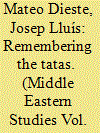

|
|
|
|
|
| Summary/Abstract |
Affluent families in Tetouan (Morocco) had female domestic servants from slave origins until well into the twentieth century. I present here a reconstruction of the trajectories and living conditions of those women, based on the recent memory of the slave-owning families themselves. This exercise raises different methodological challenges about the use of memory, while allowing us to present the transformations that the slavery system underwent in colonial Morocco. The position of female domestic servants was diverse and paradoxical, since in many cases they achieved a degree of closeness with the families, while at the same time finding themselves under a system of class and gender domination.
|
|
|
|
|
|
|
|
|
|
|
|
|
|
|
|
| 10 |
ID:
174157


|
|
|
|
|
| Summary/Abstract |
This article explores the roots and the consequences of the 1979 Iranian Revolution with a focus on one of Iran’s constituent peoples, the Kurds. It provides historical perspectives on a specific people in relation to the Revolution and aims to enhance historical awareness on the Revolution and contribute to debates around it. It is divided into two main parts. The first part deals with the roots of the Revolution by presenting an overview of social change and transformation during the preceding decades to create a historical foundation, which studies on the Kurds in Iran have usually lacked. The second part deals with the consequences of the Revolution, analysing the autonomy movement, the characteristics of which are closely linked to social change of the preceding decades. Despite the availability of sources on the period, previous scholarship has been devoid of sufficient historical analysis on both the background to, and events which took place during, the Revolution. This article addresses that gap by presenting an analysis of that historical process.
|
|
|
|
|
|
|
|
|
|
|
|
|
|
|
|
| 11 |
ID:
174159
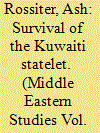

|
|
|
|
|
| Summary/Abstract |
For Kuwait in the 1920s, the most pressing problem was how to respond to the rising power of the neighbouring polity of Najd. Acting initially under the leadership of Ibn Saud, the future founder-king of Saudi Arabia, raiding Najdi tribes, many of whom followed the strict creed of Wahhabism and were referred to as Ikhwan (brotherhood), at one point threatened to conquer Kuwait. Moreover, Ibn Saud, who would later turn against recalcitrant elements of the Ikhwan, pressed his claims over large parts of Kuwaiti territory. This article analyzes how the Al Sabah rulers navigated through these turbulent waters. In particular, it explores how successive Kuwaiti leaders grappled with the uncertainty of British protection in their attempts to retain tiny Kuwait’s autonomy.
|
|
|
|
|
|
|
|
|
|
|
|
|
|
|
|
|
|
|
|
|